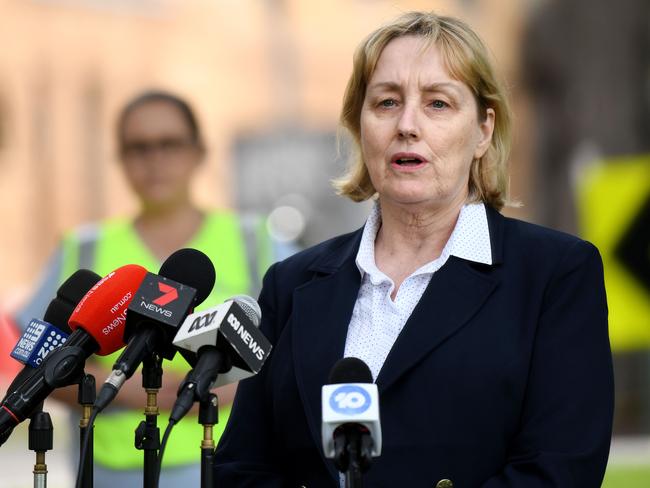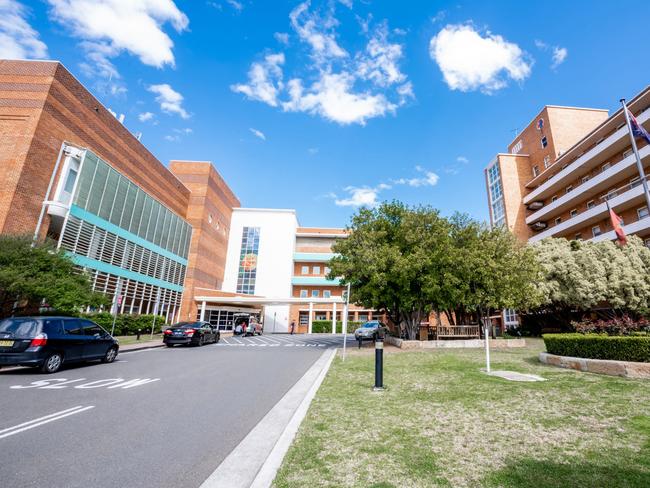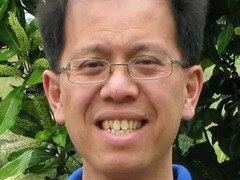Sydney Local Health District CEO Dr Teresa Anderson learns outcome of no confidence vote
A stunning new report has given more insight into the dire situation at Sydney’s Concord Hospital after a vote of no confidence in the local district health chief.
National
Don't miss out on the headlines from National. Followed categories will be added to My News.
Conditions are so bad at Concord Hospital, which is reportedly littered with broken phones and computers, just one third of its doctors surveyed would recommend going there, according to a shocking new report.
Almost half of those doctors admitted they had made fatigue-induced errors while working there. And more than 60 per cent said they feared for their health and safety because of their working conditions.
The bleak score card for Concord Hospital was revealed in the Hospital Health Check annual survey by the peak medical body the Australian Medical Association (AMA) NSW.
It comes as the Medical Staff Council at Concord voted on Thursday night in support of a vote of no confidence in Dr Teresa Anderson, the chief executive of the Sydney Local Health District, who has overall responsibility for Concord and five other hospitals.
The facilities at Concord were given the lowest score a D - 32 out of 100 - which is even lower than the total SLHD score of 39 out of 100.
And on a personal level just 31 percent of doctors said they felt valued.
“We have no common room, no secure place (such as a locker) to store belongings. There is nowhere to sleep and nowhere to prepare food.
“It is extremely difficult to park — I often circle the car park for 15 minutes, and cars parked outside of bays are ticketed. There is inadequate write up space for doctors, and many broken computers and phones.”
A spokesman for Dr Anderson said staff are encouraged to report any issues they have without fear of reprisal and can do so anonymously if they choose.
“We greatly value the vital role of clinician feedback...will continue tolisten to and work with the clinicians and all staff at Concord Hospital to ensure we continue to achieve the best health outcomes for our patients,” the spokesman said.
“The SLHD takes each of these matters seriously and will investigate every claim.”

The Minister for Health Ryan Park said he encourages all staff to report any concerns and those who do, will be supported.
“I am always keen to hear from our frontline health workers on how we can do things better and the Health System Advisory Council, which I announced this week, will allow clinicians to help drive improvements in our hospital system.”
VOTE OF NO CONFIDENCE IN HEALTH CHIEF
More than 60 per cent of medical staff from Concord Hospital supported a vote of no confidence in Dr Anderson.
In the secret ballot held on Thursday night there was also a massive show of support for Associate Professor Winston Cheung with about 80 per cent of staff voting down a counter vote of no confidence in him.
It is understood that staff now want the opportunity to talk about the problems that have been plaguing the health district and for investigations to be undertaken.
Doctors, nurses and health staff are calling for a parliamentary inquiry into the behind the scenes management of a string of major Sydney hospitals.
The call came as Dr Anderson faced the vote of no confidence Thursday night.
Doctors have spoken out saying it is the first time such a vote has happened in 30 years, and have called for the government to intervene.
“It is just the tip of the iceberg,” one said.
Staff are understood to be railing against a culture of fear and oppression they say has stopped them speaking up about what is going on inside the hospitals.
Complaints about the manipulation of waiting lists, being discouraged from reporting adverse outcomes for patients, and reprisals for people who did speak up, have reached boiling point.
In an unprecedented move, a secret ballot of all the Medical Staff Council (MSC) of Concord Hospital was held to consider the future of Dr Anderson, who oversees five hospitals across Sydney.
The vote of no confidence was proposed in an all medical staff council meeting last week called by the Staff Council chair, Assoc Prof Cheung.
A counter vote of no confidence in Assoc Prof Cheung, an intensive care specialist, was also proposed but failed.

The latest NSW Government People Matter Survey for Health revealed 17 per cent of staff across the health system say they have been bullied in the past year, and 23 per cent of staff say they have witnessed bullying.
Eighteen per cent reported being aware of alleged misconduct – behaviour that is unethical or illegal in their organisation. Twelve per cent said they experienced threats or physical harm.
And only 39 per cent said they were confident their organisation would act on the survey results, and just 37 per cent said senior managers listen to employees – a fall of two per cent.
It is understood staff want a parliamentary inquiry into the bullying and harassment they claim has gone on in NSW Health.

Doctors say they have been stopped from revealing horrific stories affecting patient care but have stressed it is not the staff at fault, rather it is underinvestment in staff, departments, processes, quality, training and research.
Staff, fearful of speaking publicly, have said the public would be extremely concerned and appalled if they knew what was going on with patient care in some cases.
There are also claims of favouritism for staff and even departments that are helpful to the administrators, and the targeting of those who are not.
Medical, nursing and allied health members say their concerns about gross maladministration have been brushed off and attributed to Covid conditions. But staff say the problems began before Covid.
Medical nursing and allied health staff are gagged from speaking publicly, and are faced with the sack if they have been found to do so.
A spokesman for the SLHD said they “take seriously the wellbeing of all its staff and acknowledges and greatly appreciates the critical work our staff do and the difference they make every day”.
“Staff who raise concerns or complaints are supported to pursue these matters through their manager or a more senior staff member, using appropriate NSW Health policies,” the spokesman said.
Do you know more: natalie.obrien@news.com.au





